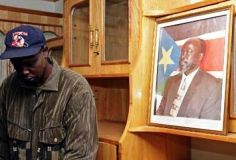Death of SPLM leader Garang rocks Sudan
By Khaled Abdel-Aziz
KHARTOUM, Aug 1 (Reuters) – John Garang, who led Sudan’s southern rebels for two decades before making peace and joining the government he fought, has died in a helicopter crash, sparking riots and fears for hard-won stability.

|
|
A southern Sudanese man mourns the death of Sudan’s former rebel leader of Sudan People’s Liberation Movement and First Vice-President John Garan near his photograph in Nairobi August 1, 2005. (Reuters). |
Garang, six of his companions and a crew of seven died over the weekend after the Ugandan presidential helicopter he was travelling in crashed, Sudanese officials said on Monday.
Members of Garang’s southern Sudan People’s Liberation Movement (SPLM) and the government in Khartoum — bitter enemies during a 21-year war that ended in January — both vowed to maintain the peace agreement Garang had helped create.
But as news of his death was confirmed, thousands of Garang’s southern Sudanese supporters took to the streets of Khartoum in the north, wielding knives and bars, looting shops, starting fires and clashing with police.
“They are beating anybody they see who looks like they are Arab,” Swayd Abdullah, a student, told Reuters.
There were reports of violence in the south too.
Garang’s death stunned the region, where Sudan’s neighbours had joined force to help bring an end to Africa’s longest-running civil war.
“It’s shocking — the loss of a visionary leader,” Kenya’s Lt. Gen. Lazarus Sumbeiywo, who was the chief mediator in the Sudan peace talks, told Reuters.
“My prayer is that the Sudanese will remain level-headed.”
Sudan’s President Omar Hassan al-Bashir expressed confidence the power-sharing peace accord would remain intact.
“We are confident that the peace agreement will proceed as it was planned and drawn up and that the future of Sudan will remain a trust in our hearts and the hearts of the brothers in the movement (SPLM),” he said in a televised statement.
“VISION FOR PEACE”
At an SPLM news conference in Nairobi, members wept in grief. “Sudan has lost its loved son Dr. John Garang,” deputy leader and presumed successor Salva Kiir Mayardit said.
“We in the SPLA (Sudan People’s Liberation Army) and SPLM will continue his vision for a peaceful Sudan. … We want to assure everyone that the leadership and all cadres of the SPLM/SPLA will remain united and strive to faithfully implement the comprehensive peace agreement.”
SPLM leaders were heading to New Site in southern Sudan for a crisis meeting.
Garang had left Uganda by helicopter late on Saturday to return to Sudan after talks with Ugandan President Yoweri Museveni. Various sources in Uganda and Sudan said it appeared the helicopter had run into bad weather, although there was also some speculation it had run out of fuel.
The helicopter came down near the remote, mountainous border region, with conflicting reports as to which side it fell on.
Garang received a tumultuous welcome in Khartoum when he was sworn in as first vice president on July 9 and signed with his old enemy al-Bashir a new interim constitution.
“My presence here today in Khartoum is a true signal that the war is over,” Garang said when he took his oath of office.
He and Bashir were due to form a new government by August 9.
SKILFUL POLITICIAN
Garang was seen as critical to the success of the peace process in the south and many hoped he would work to end Sudan’s conflict in Darfur in the west.
“What happens next is very, very interesting. In the worst case scenario, it’s a south-south war. In the best case, we will see a democratic overhaul of the SPLM, which many people view currently as something of a dictatorship,” said an experienced foreign Sudan observer well connected with the SPLM.
The southern civil war started in 1983 when the Islamist Khartoum government tried to impose Islamic sharia law on the mainly Christian and animist south. Two million people died in the conflict, mainly through hunger and disease.
Oil fuelled the fighting, with southerners laying claim to the oil fields that provide the government with vital revenues.
Garang proved an adept politician as he allied himself with communists, courted U.S. Christian groups and juggled tribal rivalries to hold power even when infighting threatened his grip on the SPLA.
Analysts say Garang has kept control of the estimated 60,000-strong SPLA through a powerful personality and a determination to give southern Sudanese an equal voice in Africa’s largest country.
Others say his genial demeanour and academic credentials masked opportunism and ruthless treatment of potential rivals.
The peace deal Garang signed gives roughly half Sudan’s oil wealth to the south. It also gives the south the right to secede after the six-year interim period.
